The poll said Corbyn would lose – so how did campaigners pull off election triumph?
After a hectic race to the line in Islington North, Isabel Loubser hears the inside story of how an MP and his supporters defied Labour’s big push to unseat him after 41 years
Friday, 12th July 2024 — By Isabel Loubser
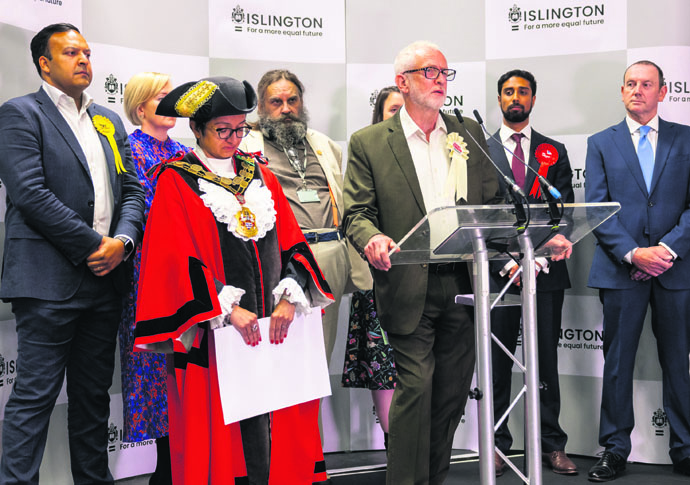
Jeremy Corbyn delivers a winner’s speech – as Praful Nargund watches on [Milo Chandler / IMDmilo.com / Ala my Live news]
IN the Bedford Arms people were shushed to be quiet as the declaration for the Islington North constituency appeared on the size of giant screen usually reserved for big football matches.
And when the final general election numbers could be heard in the pub at the end of Jeremy Corbyn’s road, the noise might have been confused for the roar which meets Bukayo Saka scoring a winning goal for the England team at the Euros.
A huge crowd of his supporters yelled, danced and punched the air – the culmination of a tense race between Mr Corbyn, now the independent MP for the area, and Praful Nargund, Labour’s new candidate.
But how did Sir Keir Starmer’s party fail to defend a 26,000-vote majority against the former leader blocked from standing?
Or maybe more pertinently how did a campaign which was starting from scratch and apparently down in the polls work its way to the winner’s podium?
It had all started with the abrupt shock of Rishi Sunak calling a snap election in May.
“I was like: what? Surely not, because we weren’t ready.” said Oly Durose, Mr Corbyn’s communications man,
“We decided we had to go now because we would have a week before the short campaign kicks in.”
Mr Corbyn had been due to end the “will he won’t he” speculation by launching an independent campaign a few weeks later, ahead of a possible autumn general election. But the surprise announcement from Mr Sunak meant his team had to mobilise quickly.
They printed 40,000 leaflets in the 24 hours, and had distributed them all within a week.
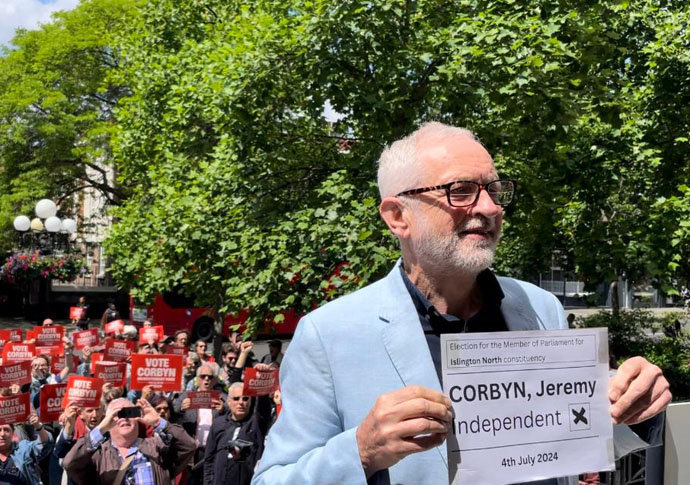
Strategists said a key moment was on the steps of the Town Hall
“We had to move at lightning speed,” said Mr Durose. “It was definitely the most stressful part of the campaign. The fact that we only had six weeks, I thought we were in trouble, because we could only spend £17,000 [election limits], and we knew the only way we could win was to reach every single voter.”
Unlike national parties, which spend years collecting and collating data on all of us and how we might vote, the Corbyn team had no clipboard information as to where or who their target voters were.
“Jeremy only had the data in his head,” said Mr Durose. “So you start with the estates and you find out your level of support. Even if you speak to 25 per cent of people, you can start to see what kind of support you have. We weren’t happy with the number of volunteers at the start of the campaign. There’s a difference between people [expressing support] on Twitter and people coming to support Jeremy. The left don’t just spontaneously canvass; left-wing movements require organising and effort to connect people with each other.”
James Schneider, director of strategic communications for the Labour Party when Mr Corbyn was leader, was drafted in as the campaign director after 12 days.
The following day, Mr Corbyn handed in his nomination papers at Islington Town Hall, and he was met by a crowd of supporters and that familiar reworking of The White Stripes’ Seven Nation Army to “Oh Jeremy Corbyn”.
The Labour campaign called it “performative”, but Mr Schneider said: “We had to relaunch the campaign to make it very clear that he was an independent. That’s why we had Jeremy handing in the nomination papers and had him holding up what it said on the ballot paper.”
This moment was designed to address one of the main challenges the team said it came up against until the very end: voter confusion.
“We knew there were high levels of confusion about whether he was Labour or independent. We just had to knock on doors and tell people he was an independent,” said Mr Schneider.
There were call-outs on social media asking for volunteers, and amplification from high-profile left-wing figures like Owen Jones. They were requests for help which were derided as desperate by his opposition, but it meant more and more canvassers started to flock to Islington North.
“The week before the NHS rally we did a big push to try and get volunteers, and suddenly there were a lot. It started to look like a big machine that was actually working,” said Alex Nunns, a former speechwriter during the Labour leadership years.
Martin Franklin, who was one of the campaign team’s main canvassers, went out day after day to assess how many votes Mr Corbyn might be able expect on polling day.
“We didn’t get much questioning about anti-Semitism, that seemed to be very marginal,” he said. “On the leafy streets, we got quite a lot of scepticism about Jeremy. Issues came up like ‘Jeremy sold us out on Brexit’, or ‘he was responsible for Brexit’.”
But Mr Franklin added: “Estates mostly were amazing because the majority of people knew Jeremy, and he had helped them out in some way, he was much-loved.”
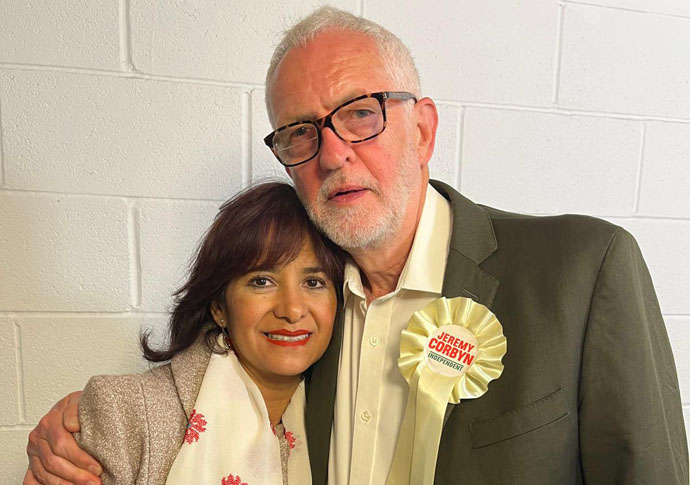
Mr Corbyn and his wife Laura Alvarez
Mr Nunns said: “The experience of being with him is a particular one, because if you walk around Islington North with him you can’t go 20 yards without someone wanting to stop him, have a chat with him, thank him.”
He recounted an incident which saw a man on a balcony watching the approaching group of campaigners, and telling them “don’t you dare knock on my door”.
But Mr Nunns said: “This guy looked at Jeremy, and you could see he recognised him. And he pointed at him and said ‘you, it’s you, you’re Jeremy Corbyn,’ and he completely changed.”
Mr Nargund also had teams of canvassers out on the streets, but the Tribune was blocked at every turn in attempts to interview the candidate or even take a photo of him on the campaign trail. The paper was supplied with a single press photo of Mr Nargund on his own carrying his clipboard.
Much of the news coming out of his campaign was relayed simply as what “Labour sources” were apparently saying.
Meanwhile, Mr Corbyn’s campaign team organised 11 rallies in the six weeks. In spitting rain and blustery winds, doctors and nurses explained how they felt Mr Corbyn had been a great defender of the NHS, and recalled how cuts to services at the Whittington Hospital had been successfully fought.
Again, those on the outside dismissed these soapbox set-pieces as a gathering of the “same old lefties”.
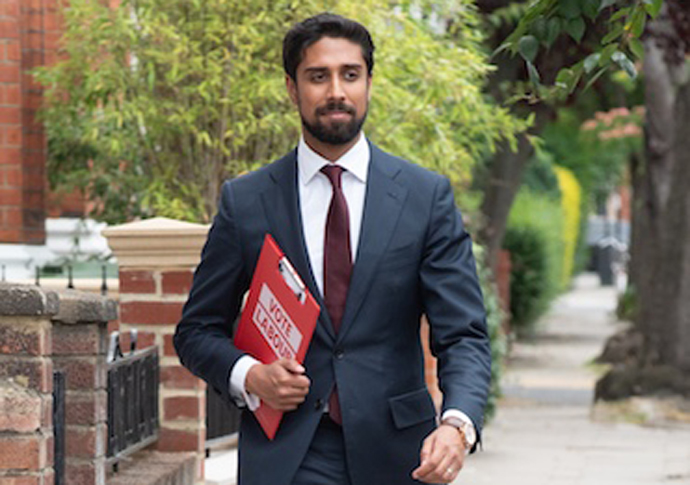
Praful Nargund
But Mr Schneider said: “Rallies are extremely effective. People hear about them and see them well beyond those who attended. They were relevant in this campaign because they were short in time period, but they were designed to then be a place for people to go out canvassing from.
“They fulfilled direct ground campaign function, and they had an air-war function because they get media coverage.”
Mr Durose added that the rallies were a “way of creating an image to mobilise people to come and join something”.
The final rally in Highbury Fields, the night before the election, saw supporters singing Bob Marley’s Redemption Song, hugging each other, and being encouraged to get everyone they knew to vote for Mr Corbyn the following day.
Mr Durose said: “Labour’s message was ‘be part of change’, that was powerful. We wanted people to feel part of something too.”
Mr Schneider said: “Labour tried to run an under-the-radar campaign as if that was their best chance of winning.”
This included not attending husting events, and of course that rigid refusal to accept the offer of space in the Tribune to set out their stall – a strategy which should not be allowed to become a precedent.
Mr Nargund released a statement after the result in which he alluded to a spread of misinformation.
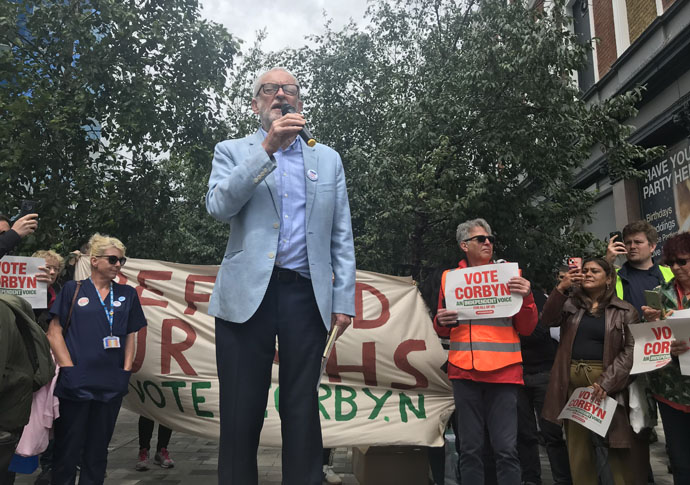
The NHS rally
“Of course there were tough times,” he said,
“And I would be lying if I said it was easy to hear and read things about me in this campaign that simply weren’t true. Sadly these sorts of tactics are rapidly becoming a regular part of our politics now, and that can’t be good.”
Mr Schneider said in response: “There was nothing remotely dirty, the campaign was positive, it was full of hope.
“And if there were any issues that Praful wished to clear up, he could have done so by opening himself to basic levels of scrutiny by turning up to hustings and offering media interviews.”
He added: “If you make your money from private healthcare, and you’re running in a constituency where the vast majority of people oppose privatisation, it would probably be incumbent upon you to explain yourself.”
There are sharp differences of opinion over this characterisation, as tensions clearly were running high at points.
One evening saw arguments about who had pushed who in a confrontation during rival door-knocking sessions, while there were also complaints about guerilla billstickers on bus stops and elsewhere promoting Mr Corbyn.
The tone of anonymous messages who either love or loathe the former Labour leader on social media was often fraught.
Then came the polling, which is rare to be conducted at a constituency level and was paid for by a left-wing fundraiser. Those who had chipped in, perhaps hoping it would show Mr Corbyn was racing away to victory, were mocked when it showed Mr Nargund was apparently on course to win. Mr Corbyn’s campaigners were together in that environmental rally in Navigator Square when news of this Survation poll, conducted just a week before polling day, was released.
It put Mr Corbyn on just 29 per cent, in comparison to Mr Nargund on a forecast of 43 per cent. Mr Durose and Mr Nunn were both visibly demoralised.
“I thought we might lose when the poll came out,” Mr Durose said.
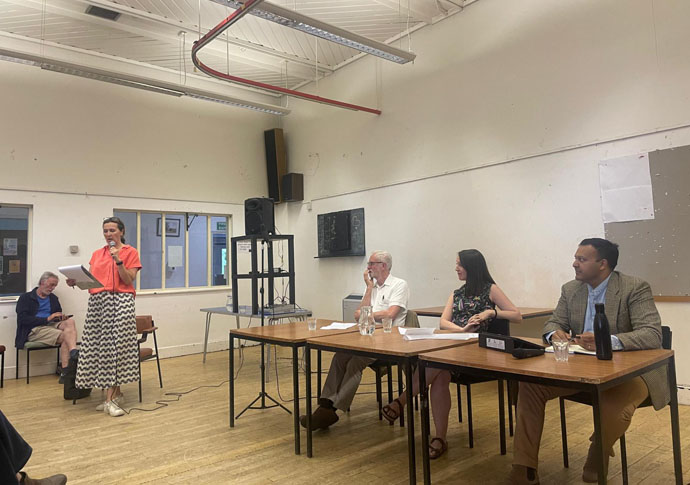
Mr Corbyn but no Mr Nargund at a husting
“What was good about it was that it was a wake-up call. People came to canvass because they saw the poll and didn’t want Jeremy to lose.”
This galvanising effect meant more people on the door and 20,000 pledges to vote for Mr Corbyn.
All fine on a clipboard, but they needed a heavy Get Out The Vote operation last Thursday.
Mr Durose said: “We knocked on doors. People stood outside train stations and told people to ‘go, do it now’.”
The scale of this operation meant the Labour team suddenly appeared to be showing nerves and a call went out for party members to get to the constituency to help get people to the polling stations for Mr Nargund. “It was a great sign that Labour were redirecting activists because they were clearly alarmed by the scale of our operation on the day,” said Mr Schneider. “The feeling was good.”
Lord Tom Watson became the latest grandee brought to the constituency to impress voters; it may be a source of debate as to how much of a killer sway the likes of Lord Peter Mandelson and Lord Neil Kinnock actually have on the doorstep when promoting a “changed Labour Party” – but we are not privy to details of its own post-election inquest.
In the end, Labour lost by 7,000 votes, with the echo of Lord Mandelson now insisting it was always likely because lots of people apparently still thought Mr Corbyn was a Labour candidate.
“This result will mean more to Jeremy than people realise. When he was told just how well he did, you could see what it meant to him,” Mr Durose said. “The only way for me to explain the 7,000 votes was that this campaign was won over 40 years of Jeremy’s service. The loyalty was iron-clad. Jeremy is a community MP who has always worked for, and with, other people.
“He won because of those people, but they wouldn’t have voted for him without the campaign organising strategy.”
Thornberry ‘sorry and surprised’ to be left on sidelines by Sir Keir
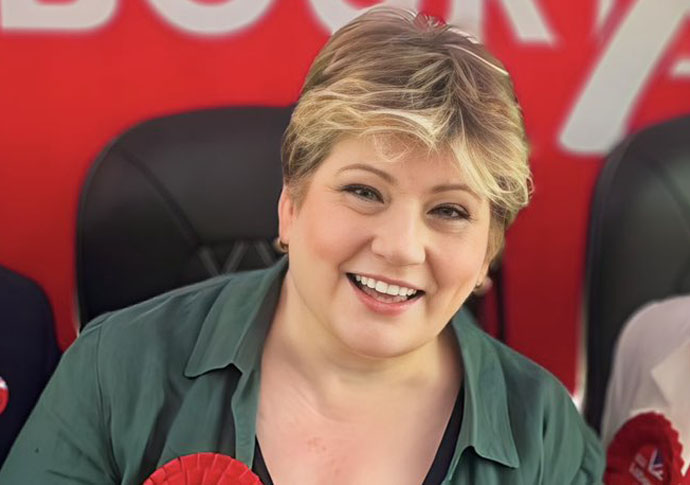
ISLINGTON South and Finsbury MP Emily Thornberry said she was “surprised” to be overlooked for a top table role as Labour returned to government, writes Charlotte Chambers.
Having served as the shadow attorney general since 2021, she was expected to be handed the role in government by leader Sir Keir Starmer.
Instead, Sir Keir appointed the human rights lawyer Richard Hermer KC to the position.
Ms Thornberry said in a statement on X that she was “very sorry and surprised” and it had left her with “personal disappointment”.
But in the same statement she added nothing could detract from “the amazing and historic victory that all of us in the Labour movement worked together to win” and promised to “continue giving my unstinting loyalty” to Sir Keir and the government.
“I look forward to supporting his government in every way I can in the years to come,” she added.
Nevertheless, Ms Thornberry (pictured) pointed out she had served in the shadow cabinet for “eight-and-a-half unbroken years” which, she added, was “a longer record of service than anyone else in that time”.
During her time in opposition, she argued, she had “always worked my hardest to keep the Labour Party united, support our candidates across the country, take the fight to the Tories, and put a positive case to the British people about what we would do differently”.
Rebel Islington councillor Phil Graham – suspended from Labour for his support for Jeremy Corbyn – said: “It just shows loyalty to the wrong people doesn’t do you any favours.”